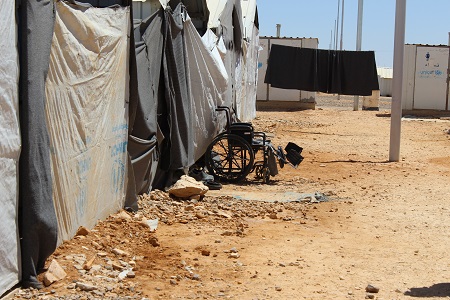When you’re compelled to do good, not even torture can stop you
Syrian Abu Omar was wrongfully imprisoned. Now his life has meaning that benefits many, including Finn Church Aid’s (FCA) recently started project to assist refugees with disabilities in Jordan.
1 July 2014 was a day to remember for Abu Omar from Syria. On that day, Omar was freed from a Syrian prison as part of a prisoner exchange. The very next day, Omar was on the Jordan border. His life began anew at the Azraq refugee camp in Jordan.
Omar had spent 11 months wrongfully imprisoned and during his sentence he was tortured. When he was set free, his arms, back and shoulders were in poor condition because his hands had often been bound behind his back with handcuffs. He was also suffering from stomach cancer which had further deteriorated his health.
The first seven months of incarceration were the hardest. Even all contact with his family was forbidden.
Omar still doesn’t want to talk about that time.
Despite everything he has gone through, Omar is still quick to smile. The meaning of life has crystallised for him.
“Helping others is in my blood. I don’t expect gratitude for the sake of God, but I’m happy to see joy on the faces of those I help”, Omar says.

There are many disabled people living at the Azraq refugee camp in Jordan.
At the service of others
Omar’s daily routine starts at four in the morning. Every day he spends two hours getting water from a well to families with disabled adults or children. Omar also helps single parents. As many as 46 families are dependent on Omar’s help every day.
Omar also works as a maintenance man for the UN. He usually works from 7.30 am to 5.00 pm, after which he goes back to his voluntary work: Omar brings food and gas bottles to those who cannot carry heavy loads themselves. Lines to the distribution points are long, and the soft sand makes carrying heavy loads challenging.
On weekends, Omar distributes a week’s worth of food to those he is helping.
Wife’s request
At the Azraq refugee camp Omar campaigns for the rights of people with disabilities. He worked for the disabled also while in prison. Since Omar arrived at Azraq, and his life got a little bit easier, and his injuries began to heal, his own wife asked him to take a step back from his calling.
That’s exactly what Omar cannot do, however. His calling even made him refuse an asylum in Canada, a dream come true for many refugees. He refused to go, despite the asylum being offered specifically to him.
“My place is with the other Syrian refugees. If I left, what would become of the families I’m currently helping?”
Omar is bound to the land also by two sons and a daughter, who are still in Syria. They can’t get into Jordan.
“Canada would be too far away from them. And I just want to help these families. It gives my life meaning.”
FCA working with the disabled
An estimated 1.4 million Syrians have been granted asylum in Jordan. As much as one third of them have disabilities or other serious health issues.
Humanitarian organisations at the Azraq refugee settlement are taking care of the needs of people with disabilities. Still, too many live without proper disability aids and assistance to help them in their daily lives.
Example: 13 children in the families Omar is helping are suffering from a mental disorder. Taking care of them in the conditions of the settlement is challenging, and some people even tie down their badly behaving children. That is degrading to human dignity. Yet, particularly for single mothers, taking care of a child with a disability is often impossible otherwise.
That is why the engagement of organisations, such as Finn Church Aid, is needed.
During the spring, FCA mapped the needs of people with disabilities at the Azraq and Zaatari refugee settlements and surrounding host communities. The survey was conducted with UNHCR. As a result, in July we will begin distributing disability aids to those who need them most. People will naturally also be trained to use the new equipment.
Psychosocial support aimed at people with disabilities will be a major part of the new programme. All FCA’s school facilities in Azraq, Zaatari and Amman will be made wheelchair accessible.
Working with us is Abilis, a Finnish Disabled People’s Organisation. Their role is to assist in training and supporting people with disabilities.
Working with us also, is of course Abu Omar!
“My hand and your hand: together we can create a better world”, Omar says and sets off again to take some water to one of his families.
Text and photos: Olli Pitkänen
FCA Regional Programme manager for the Middle East